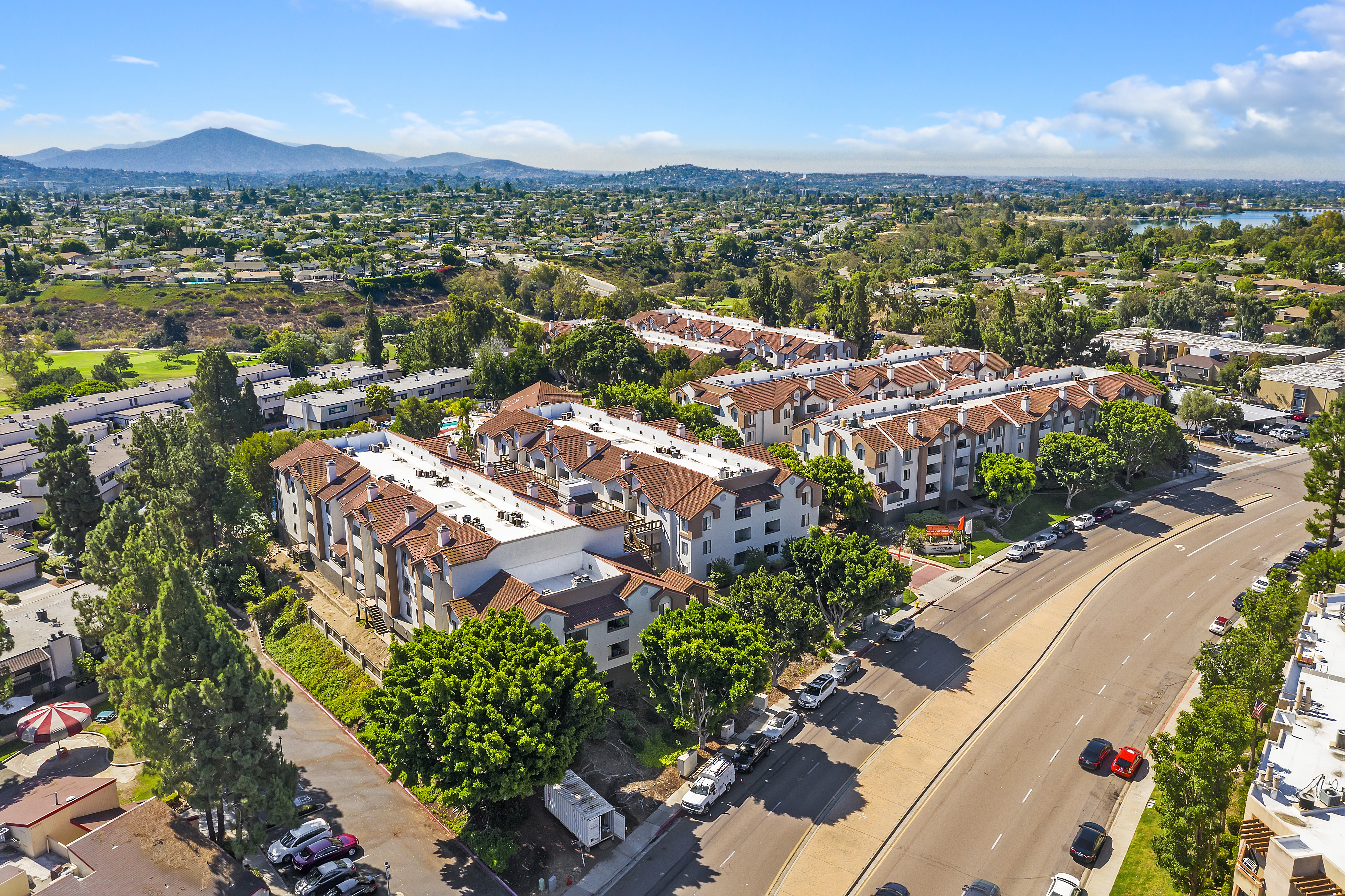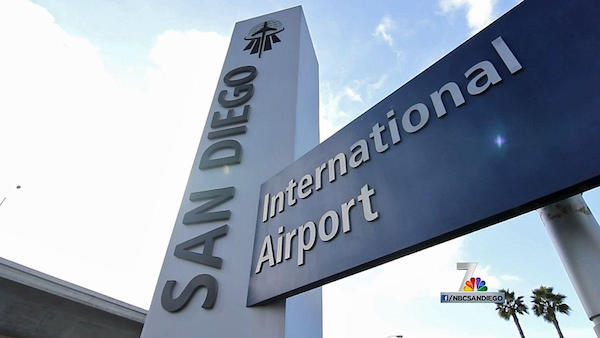Daily Business Report-Dec. 30, 2020
Mission Trails was originally built in 1987.
Large San Carlos apartment
community sold to Shapery Enterprises
Mission Trails, a 208-unit apartment community in the San Carlos neighborhood of San Diego, has been sold for an undisclosed price to San Diego-based real estate developer Shapery Enterprises.
Located at 6975 Golfcrest Drive, the 175,152-square-foot property was originally built in 1987 on a 4.49-acre lot. The unit mix is comprised of 84 one-bedroom, one-bathroom units and 124 two-bedroom, two-bathroom units. The three-building community recently underwent extensive renovations and features a resident lounge, dog park, pool, fitness center, tennis court, sport court, game room and 288 subterranean parking spaces.
The community is adjacent to Mission Trails Regional Park, one of San Diego’s largest and most popular hiking destinations. San Carlos has immediate access to SR 125, connecting the community to the rest of San Diego County.
CBRE’s Kevin Mulhern, Stew Weston, Dean Zander and John Montakab represented the seller, Orange County-based real estate investment and management firm Sares Regis Multifamily Value Add Funds, in the transaction. Shapery Enterprises was self-represented.
_______________________________________________________

‘New Laws in a Minute’ Playlist
New Year, New Laws— CalMatters has released nine “New Laws in a Minute” videos, explaining new California laws that are scheduled to take effect on the first day of the new year.
Ring in 2021 by learning about California’s new do’s and don’ts, and how they will affect us all.
_______________________________________________________
NIH funds eight studies to uncover risk factors for
COVID-19-related inflammatory syndrome in children
The National Institutes of Health has awarded a research grant to Jane C. Burns at UC San Diego to develop approaches for identifying children at high risk for Multisystem Inflammatory Syndrome in Children, a rare and severe after-effect of COVID-19 or exposure to the virus that causes it. Burns is one of eight researchers receiving grants.
Up to $20 million will be provided for the projects over four years, pending the availability of funds.
In most cases, children exposed to or infected with SARS-COV-2, the virus that causes COVID-19, will not develop any symptoms or will develop only a mild illness. Some children become seriously ill at the time of infection. Others who initially have no symptoms may go on to develop MIS-C, a severe, sometimes fatal, condition marked by inflammation of one or more organs, including the heart, lungs, kidneys, brain, skin, eyes and gastrointestinal tract.
_______________________________________________________
Realtors group to host speaker
on how Prop. 19 can benefit Realtors
The Pacific Southwest Association of Realtors (PSAR) will host a free, online webinar on how the recent voter-approved Proposition 19 can help Realtors with buyers and sellers from 11 a.m. to noon, Wednesday, Jan. 6. Presenter will be Jordan Marks, taxpayers’ rights advocate for the Office of San Diego County Assessor-Recorder-County Clerk Ernest J. Dronenburg Jr. Marks, a PSAR member, assists taxpayers with navigating assessment issues and oversees legislative and intergovernmental relations. All San Diego-area real estate professionals are invited to attend the webinar. For more information, call (619) 421-7811 or visit www.psar.org.
Prop. 19, approved by California voters by a 51.1 percent to 48.9 percent margin in the November general election, provides homeowners with an exemption from a property tax reassessment when they move to a new residence. Prop. 19 also limits property tax increases on primary residences for family transfers, homeowners over 55 years old, disabled people and victims of natural disasters or wildfires, as well as on family homes by allowing parents and grandparents to pass on their family home to their children and grandchildren for continued use as a primary residence.
_______________________________________________________
Indian Energy honored as 2020
Native American Business of the Year
Indian Energy LLC was honored by Native Business as the inaugural recipient of the Native Business of the Year Award. The award was presented at the recent Native Business Virtual Summit. The awards program celebrated Native American-owned companies and entrepreneurs who demonstrate courage, innovation and commitment to economic self-sufficiency and prosperity.
Indian Energy is a privately held microgrid developer and systems integrator, specializing in developing large-scale advanced energy resiliency solutions for the Department of Defense, Community Choice Aggregators and Tribal Utility Authorities. The company was founded in 2009 and is certified as a Small Business Enterprise and a Minority-owned Business Enterprise. Indian Energy is 100 percent Native American Indian-owned and -operated, with offices in San Diego, Anaheim Hills and Baja Norte California, Mexico.
_______________________________________________________
San Diego halfway to 2035 emissions-lowering goal
San Diego Mayor Todd Gloria Monday released the city’s 2020 Climate Action Plan report, which says the city has reduced 25 percent of its greenhouse gas emissions compared to the 2010 baseline, halfway to its goal of halving emissions by 2035.
According to the fifth annual report, the city has reached the halfway point sooner than anticipated, but actions are still necessary to meet targets for zero waste, transportation emissions and building efficiency. The report reflects reductions achieved in 2019 and does not include impacts caused by the coronavirus pandemic
San Diego is one of the largest U.S. cities to adopt a Climate Action Plan setting goals for 100% renewable energy citywide and zero waste. Alongside community partners, the city has also developed the Climate Equity Index to better understand access to opportunity in San Diego’s Communities of Concern.
_______________________________________________________
A bumpy ride for California’s
Amtrak as pandemic surges
CalMatters
Ridership on Amtrak train routes has plummeted nationwide, triggering major cuts in service and causing about $800 million in losses for the already-struggling rail service.
“It’s pretty dire,” said Donna DeMartino, managing director of the Los Angeles-San Diego-San Luis Obispo Rail Corridor Agency (LOSSAN), which operates the Pacific Surfliner that travels from San Luis Obispo to San Diego. “With so few people riding, we have very little in the way of fares that we’re collecting.”
Amtrak has asked Congress for nearly $5 billion to help keep its nationwide routes running for the next year.
That’s more than double the amount that Amtrak normally receives. Amtrak President and CEO William J. Flynn cited “the dramatic loss in ridership and revenue that Amtrak experienced due to COVID-19…We have seen that our ridership is not returning as quickly or at the levels that we had hoped for.”
While most of Amtrak’s funding comes from the federal government, California pays, too. The state spent $114 million last year to support its three routes: the Pacific Surfliner, the San Joaquins and the Capitol Corridor, which combined carried 5.66 million passengers in 2019.
Ridership nationally has dipped to around 25% of pre-pandemic levels, Amtrak announced in late November. All three of California’s routes are still struggling with low numbers of passengers.




